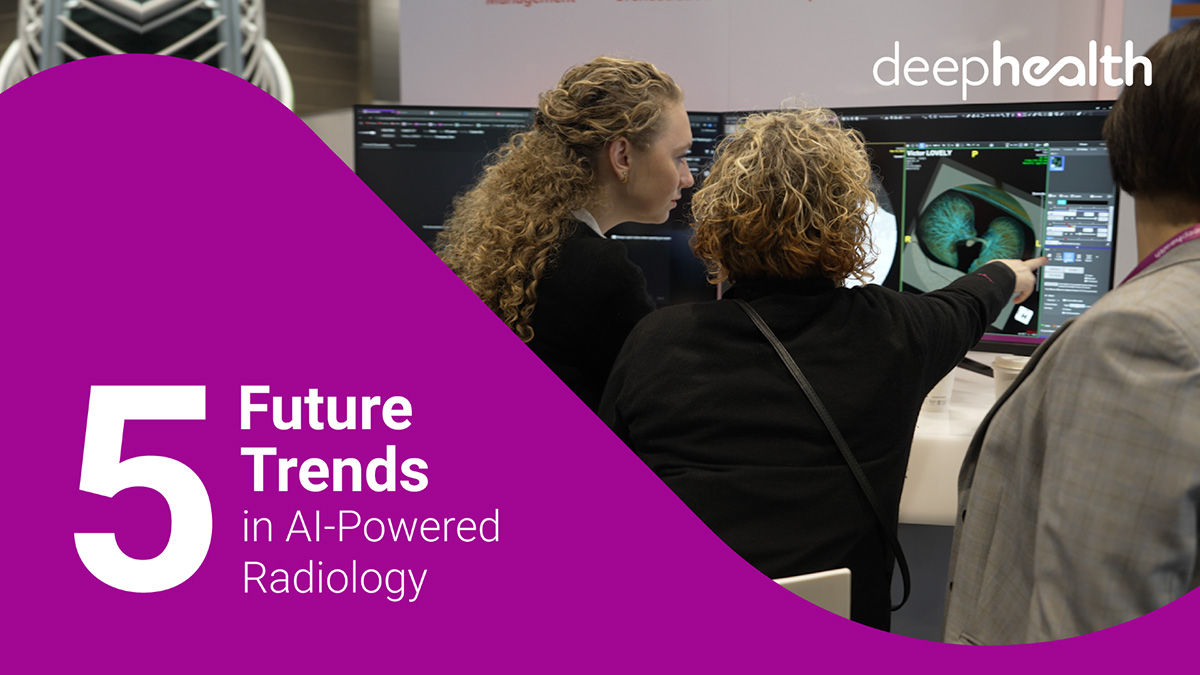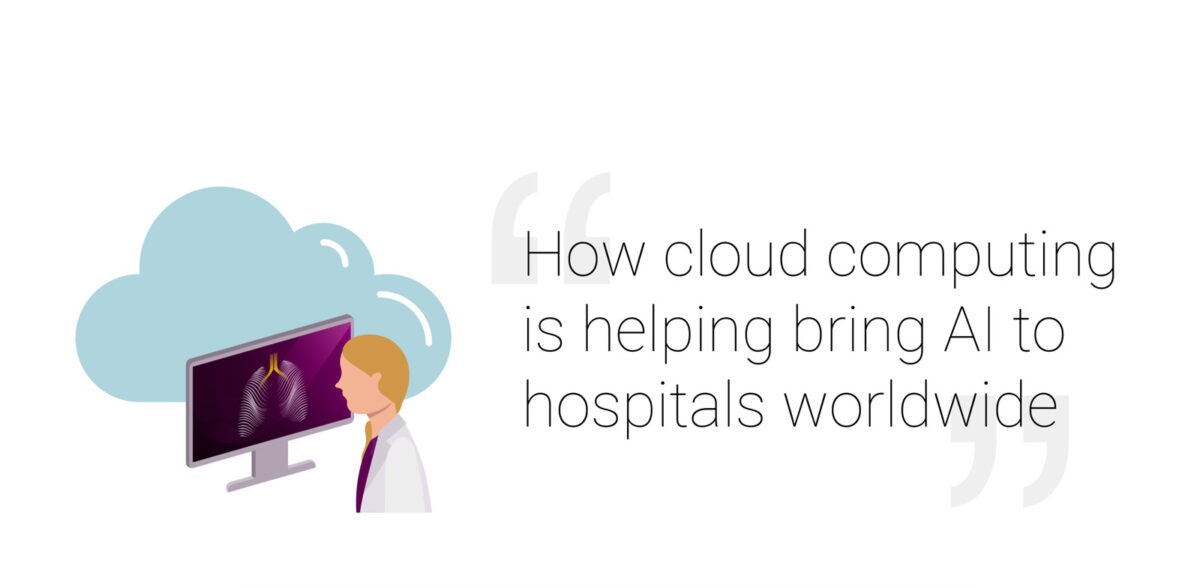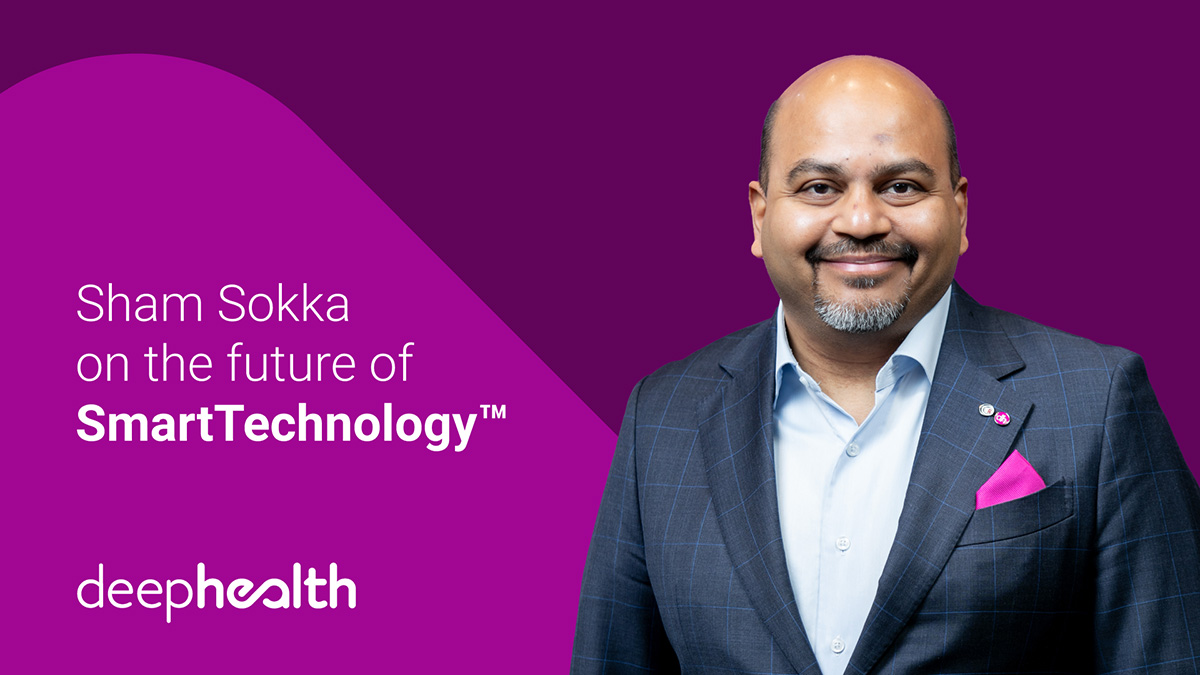The prevalence of artificial intelligence (AI) in healthcare – particularly in radiology – has increased sharply in recent years. According to the US Food & Drug administration, more than 1,000 AI-enabled medical devices have been authorized to be sold in the US – and 76% of those are in radiology.[1]
AI is rapidly reshaping the radiology landscape, and this is especially evident in cancer detection. AI-powered breast screening, for example, has shown to increase cancer detection rates by an impressive 21%.[2] In prostate cancer, AI assistance has the potential to shrink the number of missed prostate findings to only 1% in cases where radiologists alone would have missed 8% of clinically significant cancer instances.[3] We are only beginning to harness AI’s transformative potential, not only to improve disease detection but also to reduce unnecessary imaging and ensure high-quality radiology care is available and accessible for more patients.
Here are five AI trends in radiology that we expect to see more of in the not-too-distant future.
Streamline workflow and connect care teams
The modern radiology workflow is too often siloed – different people using standalone AI tools in separate systems, managing disconnected data. Fully benefiting from AI in clinical practice requires end-to-end integration that gives everyone in the radiology care pathway timely access to the information and capabilities they need. Envision a cloud-native operating system at the center of radiology operations that would unify data and connect the clinical and operational workflow. The end-to-end AI-powered informatics layer brings AI to help when needed, such as with workflow automation or clinical assistance.
The modern operations suite would replace a typical Radiology Information System (RIS) and would deliver advanced capabilities via personalized AI-powered workspaces for well-coordinated health actions across the workspaces. From patient onboarding through image acquisition, reporting and follow-up, this comprehensive approach would make sure the right information was available to the right people at the right time, streamlining operations and enabling a more seamless experience for care teams and patients.
Discover DeepHealth’s Operations Suite™
Advanced visualization and diagnostic capabilities
On the clinical side, integrating an end-to-end informatics layer with AI-powered diagnostic solutions sets the stage for advanced medical imaging interpretation. More powerful than the traditional Picture Archiving System (PACS), a cloud-native ‘diagnostic suite’ approach would bring functionalities together in a unified diagnostic workspace and enable practices to leverage AI-powered features like advanced 3-D image visualization, a real-time viewer capable of sub-second image streaming, a smart worklist to prioritize the right cases, AI-enhanced reporting to help radiologists report faster, workflow analytics for better decision making, remote collaboration, advanced image and data management, and built-in AI orchestration – all accessed through a single, cohesive interface. These powerful new visualization and diagnostic capabilities would better position medical imaging practices to address crucial market demands for enterprise imaging.
Discover DeepHealth’s Diagnostic Suite™
Unleash the full power of screening
While population screening efforts make earlier stage cancer detection possible for more patients, the workload these high-volume programs create for radiologists is a significant barrier. Even for experienced radiologists, reading and interpreting scans is complex and time-consuming. But combining AI-powered workflow efficiencies with AI’s clinical gains – like bringing generalist radiologists up to expert levels,[4] reducing unnecessary recalls,[5] and cutting down reporting time[6] – makes imaging for high volume screening more feasible and scalable.
Already in the US, AI powers the Enhanced Breast Cancer Detection program, a mammography screening initiative that processes roughly 1.4 million scans each year. Radiologists are equipped with AI-powered tools to quickly and accurately detect even subtle lesions. In Europe, the NHS England’s Targeted Lung Check Program uses an AI-powered lung solution[7] to assist radiologists in one of the world’s largest lung cancer screening efforts, where data from the UK government shows 76% of cancers detected were found at earlier stages.[8] These programs have the potential to not only improve outcomes but also help address health disparities in the midst of radiologist shortages. Expect to see more and broader disease screening and imaging-based population health initiatives made possible with the help of AI.
Discover DeepHealth’s Population Health solutions
Smart technologies for major care advances
Up-and-coming ‘smart technologies’ that bring AI-powered informatics closer to modalities – like mammography, for example – would accelerate AI adoption and enable a more seamless care delivery experience. These advancements in imaging could also usher in exciting new possibilities for medical advancement. According to DeepHealth Chief Operating and Technology Officer Sham Sokka, integrating DeepHealth’s breast AI into mammography systems could make a complete AI breast readout possible in less than five minutes, relieving the stress of waiting for results. Patients with diagnostic findings would know right away and could begin their diagnosis and treatment journey, while those without could go home directly after the scan with peace of mind that they are cancer-free. Smart technologies that deeply embed AI-powered informatics with medical devices could make breakthroughs possible in many areas – autonomous x-ray, for example.
Discover DeepHealth’s SmartTechnology™
Remote capability to increase capacity and site coordination
Radiology teams are stretched thin meeting increasing demands for faster, more precise scans, while managing higher volumes and coordinating across distributed teams. AI-powered remote platforms can help tackle these challenges head-on by enabling teams to remotely acquire images and seamlessly collaborate and allocate resources across multiple locations. Radiologists can review and interpret imaging studies from anywhere, reducing bottlenecks at high-volume locations. Specialized radiologists don’t need to be on site to provide second opinions or handle complex cases. Technologists at different sites can receive real-time assistance from experts, ensuring consistent imaging quality across all locations. Patients benefit from being able to access high-quality radiology care, no matter their location, and practices can more efficiently scale resources, optimize workflows and improve efficiency. Remote capability ensures access to the right expertise, when and where needed and AI can be used to scale remote capabilities enabling remote experts to support more sites with less effort.
Discover DeepHealth’s TechLive™ collaboration platform
No doubt, AI will continue to have a transformative impact on healthcare. Developing solutions that perform effectively across diverse populations requires utilizing large, comprehensive data sets to build and validate the algorithms. AI companies will need to train and test on a wide variety of patient data to ensure their solutions perform well across diverse patient subgroups. [9] This will help ensure that we fully harness AI’s great potential to solve clinical challenges, expand access to high-quality radiology care, and enable better health outcomes.
[1] US Food & Drug Administration. Artificial intelligence and machine learning (AI/ML) – enabled medical devices, 2024.
[2] Unpublished data from a study of 14 radiology practices (200 sites) in the United States. Data on file.
[3] Günzel et al., 2024.
[4] Faiella et al., Tomography, 2022.
[5] Reduced single reader recall rate to expert level, study on file.
[6] Ten percent reduction in reporting time for prostate scans, Cipollari et al., Radiologia Medica, 2022.
[7] Deephealth Lung (Veye Lung Nodules in Europe) manufactured for DeepHealth by Aidence B.V.
[8] UK Department of Health and Social Care. New lung cancer screening roll out to detect cancer sooner, 2023.
[9] Kim et al., 2024.






